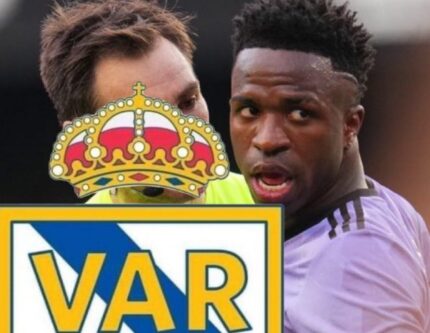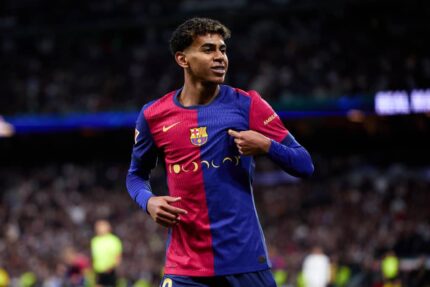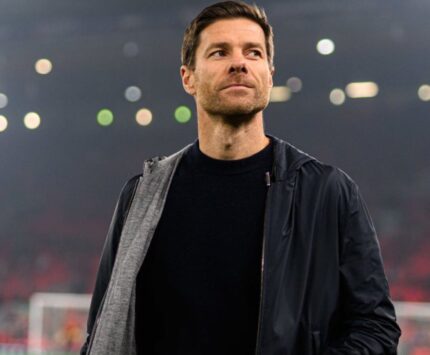The build-up to Saturday’s highly anticipated Madrid derby between Real Madrid and Atletico Madrid has been overshadowed by a deepening rift between Los Blancos and Spanish football authorities over refereeing decisions. Real Madrid has long claimed that La Liga referees, under the jurisdiction of the Royal Spanish Football Federation (RFEF), have consistently shown bias against them.
This latest row was sparked by two contentious decisions during Real Madrid’s 1-0 defeat to Espanyol last weekend. The first involved Espanyol defender Carlos Romero, who escaped with only a yellow card after bringing down Kylian Mbappe on a clear counter-attack. To make matters worse, Romero went on to score the game’s only goal. Madrid was further enraged when Vinicius Junior’s first-half goal was disallowed for a perceived foul by Mbappe in the Espanyol penalty area—a decision upheld by VAR without review.
Head coach Carlo Ancelotti expressed his frustration, labeling the refereeing “inexplicable.” Many Spanish football pundits agreed that Romero should have been sent off, with even the player himself admitting his challenge was “a bit ugly.” Madrid’s grievances escalated quickly, with the club lodging a formal complaint with the RFEF and demanding access to VAR audio recordings related to the controversial calls.
Real Madrid’s Response: Media Backlash and Official Complaints
Real Madrid wasted no time in launching a full-scale offensive against the Spanish refereeing system. The club’s official channel, Real Madrid TV, accused Spain’s Technical Committee of Referees (CTA) chief Luis Medina Cantalejo of leading an organized effort to undermine Madrid. Pundits called for the removal of VAR chief Carlos Clos Gomez and RFEF president Rafael Louzan, pointing to past officiating scandals.
Madrid’s official website also slammed the referees, arguing that in the disallowed Vinicius goal incident, it was actually Espanyol’s Pol Lozano who fouled Mbappe—not the other way around. On Monday, the club sent a formal letter to the RFEF and Spain’s High Sports Council (CSD), branding the refereeing system as “rotten from the inside.” They insisted on immediate access to VAR recordings, citing concerns over fairness and transparency.
This isn’t the first time Madrid has voiced concerns over refereeing bias. Club president Florentino Perez has frequently criticized VAR inconsistencies, calling for major reforms. In a November 2023 AGM, he lamented that “nobody knows who draws these VAR lines or what frames they choose,” demanding governmental intervention in Spanish refereeing structures.
RFEF and La Liga Push Back Against Madrid’s Allegations
The Spanish football authorities swiftly responded to Madrid’s accusations, rejecting claims of bias and condemning the club’s rhetoric as damaging to the league’s integrity. In a strongly worded statement, the RFEF reaffirmed its commitment to “transparency and fairness” and criticized Madrid for their “irresponsible” attempts to pressure match officials.
Coincidentally, the controversy erupted just days before a scheduled meeting between the federation, La Liga, and club representatives to discuss potential refereeing reforms. Madrid had initially planned to attend but withdrew in protest over the Espanyol match. Discussions at the meeting focused on restructuring the CTA, increasing VAR transparency, and potentially making the refereeing body independent from the federation.
Several high-profile football executives, including Sevilla president Jose Maria del Nido Carrasco and Atletico Madrid CEO Miguel Angel Gil Marin, criticized Madrid’s handling of the situation. They argued that refereeing controversies should not be weaponized for political gain, warning that Madrid’s relentless pressure on officials could harm the league’s reputation.
Atletico Madrid’s Subtle Jabs and Derby Mind Games
Atletico Madrid, traditionally at odds with their city rivals, didn’t hesitate to poke fun at the ongoing dispute. The club’s social media accounts posted sarcastic tweets listing verbs such as “pressure,” “intimidate,” and “coerce,” implying Madrid’s tactics to influence referees. They also shared graphics titled “Basic Instructions for the Derby,” humorously suggesting Madrid would use their TV channel and media allies to create pressure on officials.
On the sporting front, Atletico players sought to downplay the controversy. Goalkeeper Jan Oblak urged for referees to be left alone, stating that “the best way is to let them do their job at the best possible level.” Defender Jose Maria Gimenez echoed similar sentiments, hoping external noise wouldn’t impact the officiating.
Real Madrid, meanwhile, doubled down on their grievances. RMTV aired a five-minute video highlighting past referee decisions against the club, focusing on Saturday’s match referee Cesar Soto Grado and VAR official Ricardo de Burgos Bengoetxea. The move further fueled speculation that Madrid was attempting to preemptively pressure officials ahead of the high-stakes derby.
La Liga’s Power Struggles: Perez vs. Tebas
Madrid’s ongoing battle with refereeing authorities is part of a larger power struggle between club president Florentino Perez and La Liga chief Javier Tebas. The two have clashed on multiple fronts, including the European Super League project and league broadcasting rights.
Tebas, a vocal advocate for refereeing reform, has pushed for a more independent officiating body, similar to the English Premier League model. However, he has accused Madrid of blocking past reform efforts while simultaneously portraying themselves as victims of biased officiating. “Real Madrid are against everyone,” Tebas remarked, dismissing the club’s complaints as an orchestrated act of “victimhood.”
After the latest dispute, La Liga announced plans to file a formal complaint against Madrid’s letter and is reportedly considering legal action. Tebas emphasized that while refereeing reform is necessary, Madrid’s approach—framing themselves as perpetual victims—only serves to destabilize the league.
As the Madrid derby looms, the bitter feud between Real Madrid and Spanish football authorities has injected additional tension into an already fiery rivalry. Whether the referees remain unaffected or succumb to the pressure remains to be seen, but one thing is certain—the controversy is far from over.














